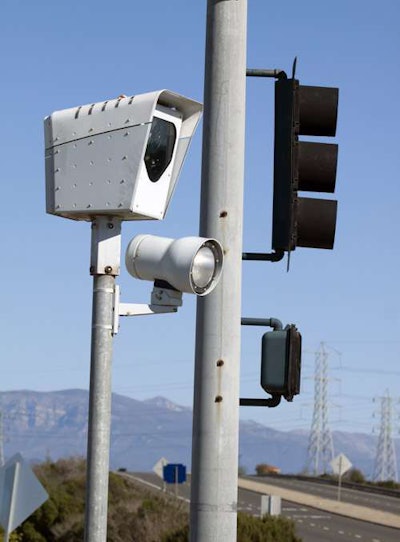A few months after attending the 2011 Great American Trucking Show, I received a letter from the Dallas police: Surprise, surprise! Our camera caught you running a red light. Here’s how to pay your $90-plus fine.
I checked the intersection on a map and had no recollection of the light being red as I turned. All I remembered of that drive was being hyper-alert to negotiate a rental car through busy traffic on streets I didn’t know without having a wreck. As they say, no good deed goes unpunished.
 The new IIHS study concludes red light cameras are very effective in reducing accidents.
The new IIHS study concludes red light cameras are very effective in reducing accidents.This came to mind with the announcement today of a new study that says red-light programs reduce accidents. This was released by the Insurance Institute for Highway Safety, a well-respected group that Overdrive and many other outlets have cited over the years.
IIHS says: “The study looked at a camera program in Arlington, Va. where red-light running rates have decreased at intersections with cameras. They found the largest decline – 86 percent – in violations that prove to be the most dangerous, occurring 1.5 seconds into the red light cycle… Another IIHS study of large U.S. cities in 2011 found that safety cameras reduced the rate of fatal red-light running collisions by 24 percent.”
The IIHS press release ignores one of the most obvious safety drawbacks of these cameras: rear-end collisions. As one Landline story points out, a New Jersey study showed right-angle crashes dropped by 15 percent at monitored intersections, but rear-end wrecks rose by 20 percent. Furthermore, the “crash severity cost” rose by $1.2 million at those intersections.

Nevertheless, as long as there is someone authoritative making a case for safety, there’s not much to restrain the other motivation for police forces: revenue. So don’t expect spy cameras to go away.
It’s not easy to fight these tickets, but there are some options.
This collection of tips on beating a camera ticket, written by a trucker, also has video of wrecks and near-wrecks recorded by a camera at an intersection.
These tips also raise good points, such as whether the ticket you receive is legitimate or a scam.
Finally, the National Coalition for Safer Roads offers a slick infographic on red light safety statistics.
What do you think about traffic cams?











